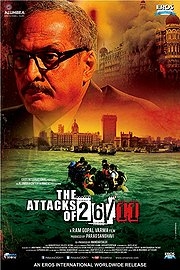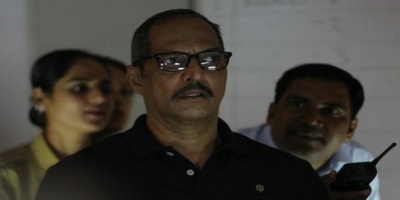The Attacks of 26/11

It’s a little bit hard to explain this film. I’ll start with the plot. Based on true events, the film documents the journey of ten men who arrive in Mumbai and bomb six separate locations – the Taj Mahal Hotel, Leopold Cafe, Oberoi Hotel, Mumbai Chabad House, Cama Hospital and a busy Mumbai train station. After setting off the explosions, they proceed to kill as many people as they can with machine guns in a series of attacks that the film claims in a message at the start were ‘far more shocking than 9/11’. 166 people died, and more than 308 were injured.
The Attacks of 26/11 is a harrowing film, or at least it is intended to be. No one is spared in the shootings: women, children and dogs are all slaughtered in nasty fashion. Blood flies everywhere, police slip over in pools of it; it drips down the walls and coats the faces of the assailants; it sprays into the camera as a man’s throat is (slowly) cut on a fishing boat at around the fifteen minute mark. The gripe with this film though is that the violence is done badly. The gunshot sounds don’t sync with what is shown on screen. The same with the sound of a child wailing over its mother’s dead body. Reactions to gunshot wounds are delayed and over-exaggerated. There’s even a cry of ‘Nooooooooooo!’ at full-tilt by a kneeling officer, arms raised up to the ceiling.
In fact, most of the acting is over-exaggerated. Nana Patekar tries to put his best Harrison Ford-style gravitas on as the Joint Commissioner and sadly falls flat. He recounts his actions on the night of the attacks. ‘I went to the living room and all three phones started ringing,’ he growls, ‘My mobile phone, my landline and the police hotline’. Cut to a lengthy shot of him in his living room staring at each of his three phones in turn and NOT PICKING THEM UP. During an interrogation scene he is handed a cup of tea, which he flings to the floor in a ‘rage’ without having taken a sip. He frowns and snatches his glasses off before adopting a macho ‘thinking pose’. It’s like Patekar religiously watched CSI: Miami for inspiration, and sadly – unintentionally, I’m sure – the Joint Commissioner ends up looking comical. This isn’t helped by a lingering shot of him dipping his toes into the sea and staring into the sunset, hands on hips, at the close.
 The film’s one saving grace is Sanjeev Jaismal as Ajmal Qasab; a pantomime villain throughout until the end when he reveals the motivations behind the attacks. He speaks of a god called Aaka whom he believes instructed him to wage Holy War on earth so they will be rewarded in the afterlife and ‘surrounded by gorgeous beauties’. The audience will likely be reminded of the apparent mindset of terrorism cells and organisations, hell bent on appeasing a higher power by causing destruction. If this was the point director Ram Gopal Varma was trying to make, he succeeded.
The film’s one saving grace is Sanjeev Jaismal as Ajmal Qasab; a pantomime villain throughout until the end when he reveals the motivations behind the attacks. He speaks of a god called Aaka whom he believes instructed him to wage Holy War on earth so they will be rewarded in the afterlife and ‘surrounded by gorgeous beauties’. The audience will likely be reminded of the apparent mindset of terrorism cells and organisations, hell bent on appeasing a higher power by causing destruction. If this was the point director Ram Gopal Varma was trying to make, he succeeded.
The difference between this film and, say, a Hollywood film is that a Hollywood film would be aware when copious amounts of violence slips into the ridiculous. The Attacks of 26/11 isn’t, and passes off the whole thing as a gripping drama intended to keep us on the edge of our seats. However, as one IMDb user commented, this is essentially a dramatisation of real events. Not only that, but it’s a Bollywood dramatisation and not a documentary. Keep this point firmly in mind should you decide to see it.

Recent Comments